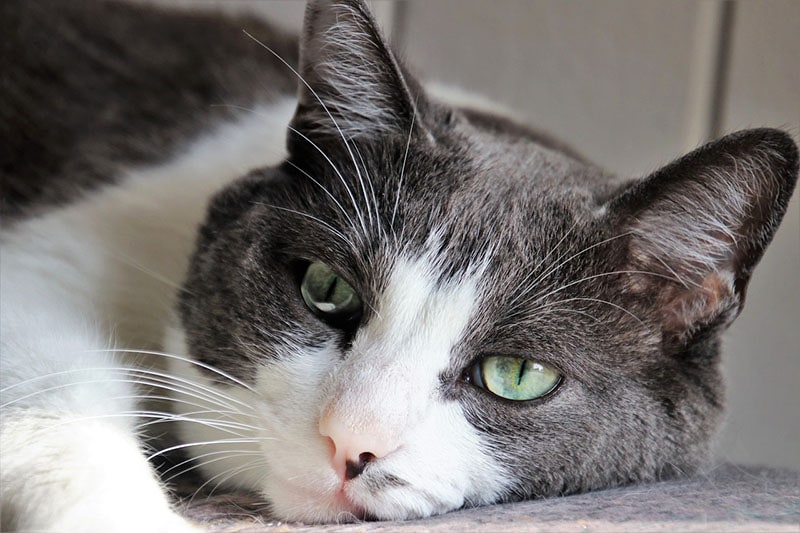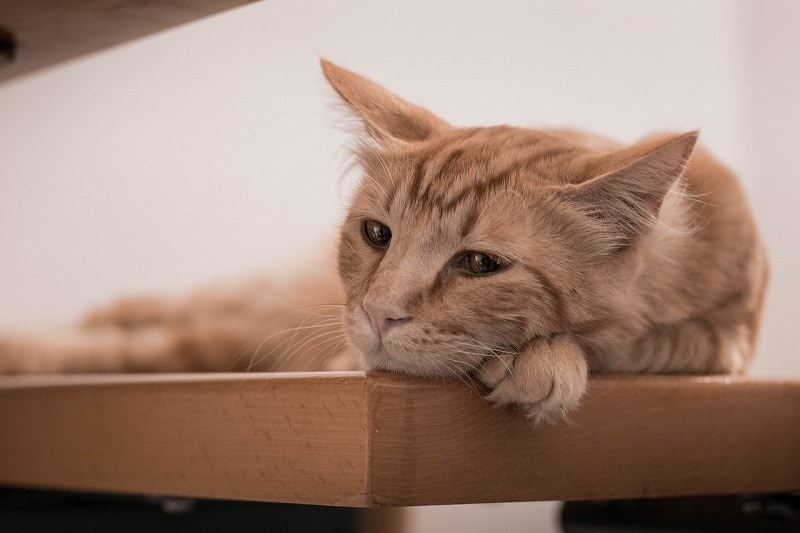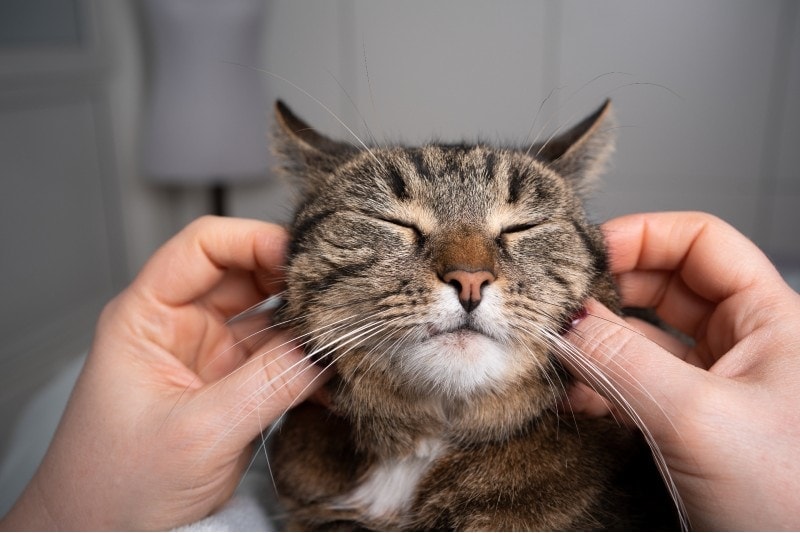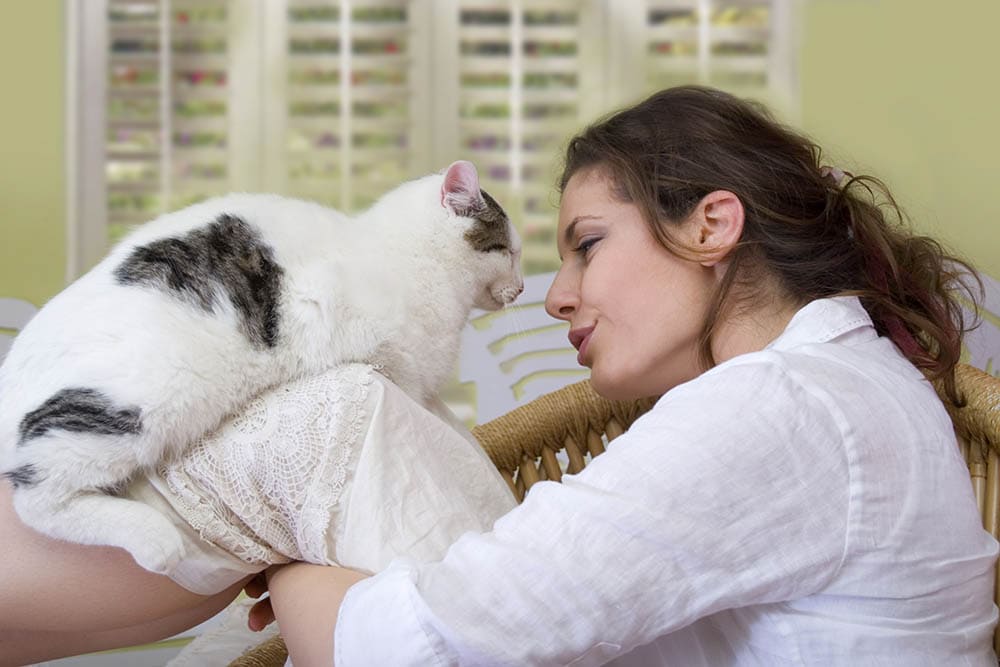7 Reasons Why Your Cat Suddenly Doesn’t Want to Be Touched (Explained!)

Updated on

Perhaps the biggest betrayal in pet ownership is when your beloved cat suddenly turns and leaves a nasty scratch on the back of your hand after you’ve pet them. It’s easy to jump to the conclusion that perhaps your cat hates you. Fortunately, that isn’t usually the case.
Cats can be particular about when and where they’re touched, and they will use aggression as a way to protect themselves from pain. At first glance, their sudden hissing can be worrying. But they can’t explain to us how we’ve crossed the line, so figuring out why they’re upset requires a bit of trial and error. We hope that this list of possible reasons for your cat’s grumpiness can help you out.
The 7 Common Reasons Why Your Cat Doesn’t Want to Be Touched
1. Aging
As your cat ages, their personality might change due to hormones or age-related illnesses like feline dementia. Dementia often results in disorientation, activity level changes, and changes in the way that your cat interacts with you and other pets. You’ll need to take your cat to a veterinarian for a proper diagnosis and to discuss treatment options.
Hormones as your cat ages can also interfere with their reactions to you, especially if your cat hasn’t been fixed. When female cats go into heat or male cats smell a nearby female in heat, they might be grouchier toward you. This isn’t anything that you did, it’s just their hormones running rampant.

2. Not in the Mood
When our cat suddenly turns on us, it can be alarming. However, your cat isn’t necessarily lashing out because they’re getting old or are in pain. Sometimes, your cat just wants to be left alone. Maybe they’ve spent all night hunting mice or are exhausted from playing with the new kitten.
Whatever their reasoning, if your cat hisses or swats at you when they’re curled up for a nap, they’re probably just tired or simply too worn out for social interaction. Give them time to recharge on their own, and they’ll be back on your lap or curling around your feet in no time.
3. Pain or a Health Issue
One of the most difficult issues to figure out when it comes to cats is the presence of pain or underlying health issues. Cats are excellent at hiding their suffering under their usual aloof behavior. They’re not infallible, though, and lashing out when you touch them when they’re usually relaxed can be a sign that you touched a tender spot or a health issue is making them frustrated.

Pain isn’t the only reason, though, and you should pay attention to other symptoms before rushing your cat to a veterinarian. Along with aggression in otherwise friendly cats, common symptoms of pain in cats include:
- Vocalizing
- Decreased appetite
- Failure to use the litter tray
- Over or under-grooming
- Lethargy
- Limping
4. Playtime
We all love cuddling with kittens, but they’re also the most likely to lash out when we want to fuss with them. This isn’t often meant vindictively; most of the time, it’s simply that your kitten wants to play more than they want attention. It can also be a complete accident, especially if you’re not quite fast enough to remove your hand from the jingle ball that your kitten wants to pounce on.
Adult cats might play less often, but they’re susceptible to falling into this over-excited playfulness too. If your cat is racing around and enjoying themselves, join in by tossing a ball for them. Give them time to calm down before you try to pet them, though, as they’ll be less likely to decide your hand looks like a fun toy too.
5. Trauma
Unless you’ve had your cat since they were a kitten, it’s unlikely that you’ll ever truly know if they’ve experienced something traumatic that has made them wary about being touched. If you’ve recently adopted a cat, for example, it’s important to consider the possibility of past abuse or trauma that could affect how they interact with you.
Being standoffish with you as they settle into the house is to be expected. They’ll likely settle into their new routine after a few weeks. If they’re mostly relaxed around you but flinch when you take them by surprise or move too fast, it might be a traumatic response.
You must build trust between you and your cat, which means making sure your cat knows where you are and approaching them calmly when you want to pet them.

6. Unpleasant Scent
We often forget that cats rely on their noses just as much as dogs do, and a strange or unpleasant scent can make them wary about being touched. If you met a dog during your grocery shopping and stopped to say “hi” to your cat, they will be able to smell the strange animal on your hands. They might be too wary about the new scent to let you touch them.
The same is true if you’ve just cleaned the countertops with citrus-smelling cleaning chemicals. You should wash your hands before touching your cat to remove any lingering chemicals, but the scent itself might still linger on you. Cats are notorious for disliking citrus smells and are unlikely to want you to touch them until the smell has faded.
7. Wrong Place
Pet owners who are familiar with cats — and dogs — quickly learn that animals have sweet spots that they love to have scratched. For cats, the best spots are often beneath their chin, behind their whiskers and ears, and at the base of their tail. While there might be a few other places where your cat loves to be scratched, another feline might hate any attempts to touch them somewhere else.
If your cat is grouchy about being petted, try an area you know they like, such as their chin or the base of their tail. They might just be telling you that they don’t want their ears messed with or they don’t like having their belly scratched.

Does My Cat Dislike Me?
One of the first things that we think when our cat lashes out at us is, “What did I do wrong?” or “Why does my cat hate me?” While your cat might be angry with you if they feel neglected or if you’ve scared them — even if it was just an accident — most of the time, they don’t hate you at all.
You have to remember that cats have different ways to show their affection than we do. Dogs might be happy to shower you with obvious affection, but cats are more reserved. They love you just as much as you love them, but they also value their alone time. If they feel like they don’t have enough time to recharge, they’re more likely to be grouchy with you and might even lash out in an attempt to fend off your attention.
More often than not, if you give your cat time to themselves or wait for them to come to you, they’ll be more than happy to bask in your affection.

Final Thoughts
Cats are known for their naturally aloof natures, but they can be affectionate toward people they trust. Their friendliness is harder to believe when they suddenly lash out, but they often don’t turn on you because they hate you. Most of the time, your cat is telling you that they want to be left alone, or it’s their way of saying, “Ouch! That hurt!”
Pay attention to your cat to figure out why their behavior has suddenly changed, and give them time to themselves before trying to pet them again.
- Related Read: Does My Cat Hate Me? How to Tell & Bonding Tips
Featured Image Credit: Julita, Pixabay










